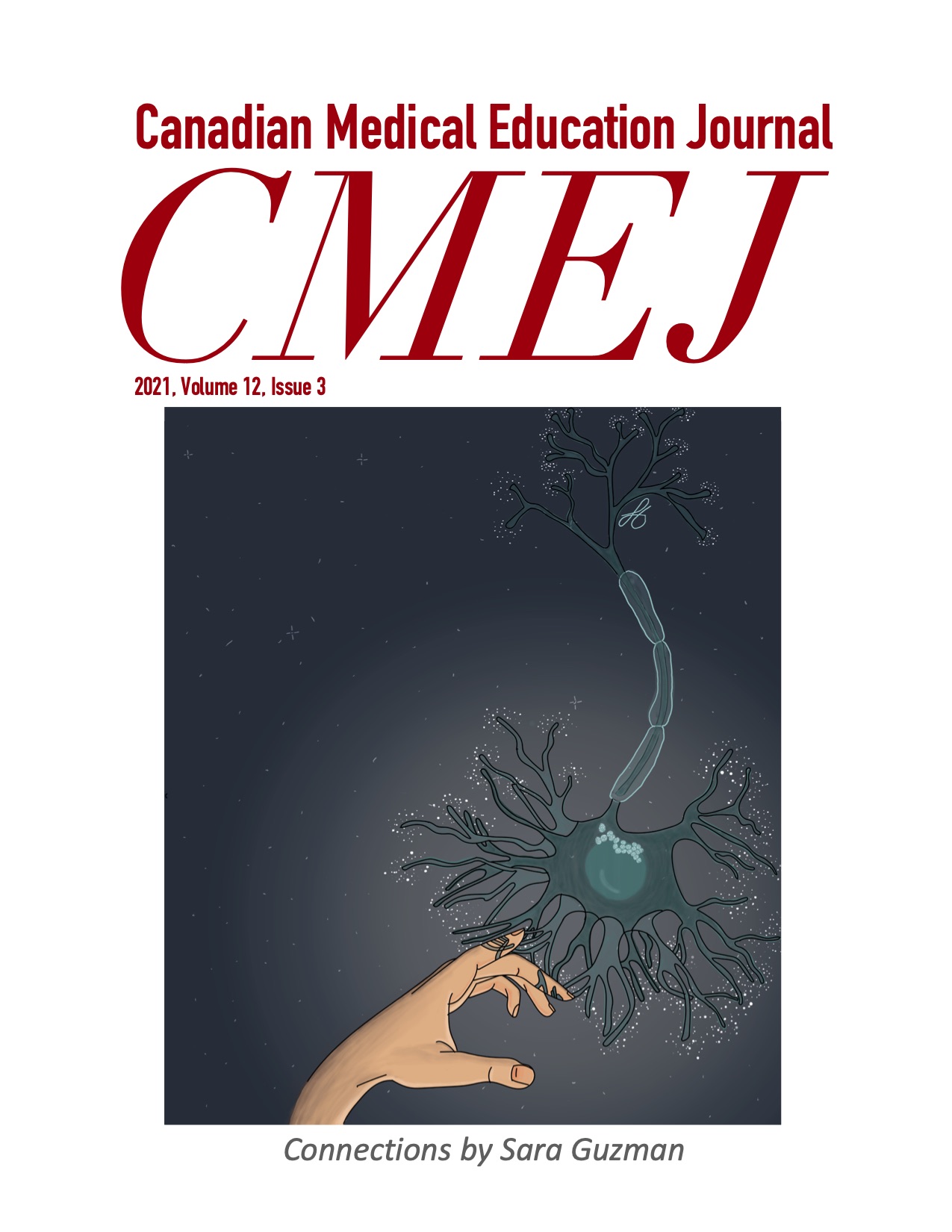Vers une éducation médicale axée sur les compétences dans le domaine de la psychiatrie des toxicomanies: une revue systématique
DOI :
https://doi.org/10.36834/cmej.69739Résumé
Contexte : Les directives actuelles du programme d’études pour la formation sur les toxicomanies en psychiatrie doivent être adaptées au cadre de la CPC pour intégrer les compétences cliniques en toxicomanie.
Objectif : Nous avons effectué une revue systématique de la littérature afin de repérer les interventions éducatives visant à renforcer les compétences des résidents et des stagiaires post-doctoraux (fellows) en psychiatrie des toxicomanies.
Méthodes : Suivant les lignes directrices PRISMA, nous avons effectué une recherche dans cinq bases de données couvrant la période allant de leur création jusqu’à août 2020 pour recenser les études de type évaluation portant sur le développement de compétences en matière de toxicomanie par les résidents et les stagiaires postdoctoraux (fellows) en psychiatrie. Nous avons évalué la qualité des études à l’aide de l’outil d’évaluation du risque de biais de l’Institut Joanna Briggs pour les études observationnelles.
Résultats : Dix-sept des 1600 études répertoriées répondaient à nos critères d’inclusion. Les compétences en matière de psychiatrie des toxicomanies couvrent les thèmes de développement des connaissances de base; l’attitude, la communication et les habiletés de leadership; le dépistage, l’évaluation et le diagnostic; la prise en charge; et les populations particulières. Parmi les exemples d’interventions éducatives efficaces visant à améliorer les compétences en matière de toxicomanie figurent les modules portant sur les troubles liés à l’abus de substances et les stages cliniques intégrées qui combinent simultanément plusieurs types d’habiletés. L’expérience concrète vécue semble améliorer l’attitude des apprenants à l’égard de la pratique de la psychiatrie des toxicomanies.
Conclusions : Bien qu’il existe actuellement des preuves à l’appui de stratégies visant à développer les compétences en psychiatrie des toxicomanies, le manque d’étude mesurant le maintien des compétences sur une période de suivi plus longue et l’absence d’essais cliniques randomisés limite la force des preuves de la présente revue. Les APC qui abordent actuellement la dépendance ne recoupent que partiellement les lignes directrices pour les cursus de formation et le contenu des études recensées dans notre revue. Ces APC doivent être mieux définies pour les programmes d’études et les compétences qu’elles visent doivent être mieux circonscrites pour les résidents et les superviseurs. De surcroît, des évaluations doivent être effectuées pour garantir l’atteinte et le maintien d’une compétence adéquate en matière de toxicomanie.
Téléchargements
Publié
Numéro
Rubrique
Licence
© Anees Bahji, Joshua Smith, Marlon Danilewitz, David Crockford, Nady el-Guebaly, Heather Stuart 2021

Cette œuvre est sous licence Creative Commons Attribution - Pas d'Utilisation Commerciale - Pas de Modification 4.0 International.
La soumission d’un manuscrit original à la revue constitue une indication qu’il s’agit d’un travail original, qu’il n’a jamais été publié et qu’il n’est pas envisagé pour publication dans une autre revue. S’il est accepté, il sera publié en ligne et ne pourra l’être ailleurs sous la même forme, à des fins commerciales, dans quelque langue que ce soit, sans l’accord de l’éditeur.
La publication d’une recherche scientifique a pour but la diffusion de connaissances et, sous un régime sans but lucratif, ne profite financièrement ni à l’éditeur ni à l’auteur.
Les auteurs qui publient dans la Revue canadienne d’éducation médicale acceptent de publier leurs articles sous la licence Creative Commons Paternité - Pas d’utilisation commerciale, Pas de modification 4.0 Canada. Cette licence permet à quiconque de télécharger et de partager l’article à des fins non commerciales, à condition d’en attribuer le crédit aux auteurs. Pour plus de détails sur les droits que les auteurs accordent aux utilisateurs de leur travail, veuillez consulter le résumé de la licence et la licence complète.











